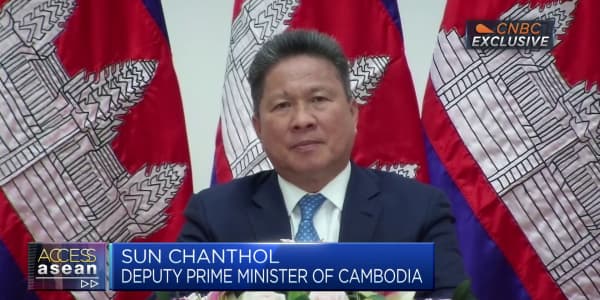Indonesia has ambitious plans to relocate its capital from Jakarta to Nusantara in East Kalimantan.
The move, expected to take place by 2045, is part of Indonesian President Joko Widodo's plan to distribute economic activity throughout the country and reduce the capital's population and traffic congestion.
Jokowi, as he's popularly referred to at home, is fervently optimistic about the mega project. He believes business and investment opportunities Nusantara will bring for Indonesia.
At a June conference in Singapore, the president touted investments in Nusantara as a "golden opportunity." He sought to assure investors the project "will continue to be safe" no matter who wins the 2024 presidential elections.
However, some researchers have expressed reservations about moving the capital.
The Indonesian government aims to relocate up to 1.9 million people to Nusantara by 2045, with some civil servants moving as early as 2024. Such a plan will likely fail as the project is still in its early days, according to Melinda Martinus, lead researcher for Socio-Cultural Affairs at the ISEAS-Yusof Ishak Institute.
"People need to be attracted to come to a new place. They first need to see robust infrastructure like schools, hospitals, and housing facilities or it won't be attractive for them to move there," Martinus told CNBC.
Nusantara National Capital Authority, a government agency charged with planning and constructing the new capital, did not immediately respond to CNBC's request for comment.
Funding concerns
Nusantara is estimated to cost around $35 billion to construct, but the government has only committed to investing 20% of the money needed, according to the project's official site.
Priority will go to building main roads, water sanitation infrastructure, the presidential palace and the vice president's office, according to the country's Ministry of Public Works.
We believe the basic infrastructure being put up until 2024 will serve as a strong foundation for private investments to come in.Agung WicaksonoNusantara National Capital Authority
Jokowi's administration hopes the remaining 80% of funding will come from foreign investors, but there has been some hesitation about pumping money into the project, and that could further derail progress, researchers told CNBC.
It won't be easy for the government to secure 80% of foreign investments unless it can provide evidence of Nusantara's feasibility and assurance that the project will continue even if a new administration takes office next year, said Ju Ye Lee, economist at Maybank Investment Banking Group.
She explained that Indonesia's government is not a big spender of infrastructure.
The country's infrastructure budget has been falling since 2017 when it reached its peak of 2.8% GDP, but dipped to 1.9% GDP last year, according to a Maybank report.
Researchers who spoke to CNBC said that with a lack of visibility on the success of the project, the government may have to increase its funding to more than just 20%.
Asked if the government will increase investments to more than 20%, Agung Wicaksono, deputy for funding and investment at the Nusantara National Capital Authority, said it's not part of the discussion right now.
"But we believe the basic infrastructure being put up until 2024 will serve as a strong foundation for private investments to come in," Wicaksono told CNBC in June.
"In the game of investment, you need to show skin in the game. So this is the government showing skin in the game."
Bruno Lanvin, president of Smart City Observatory at the IMD Business School, said investors from Asia-Pacific need to take the lead before the rest of the world will follow suit.
"Investors are like sheep, they like to go where the others are going," said Lanvin.
"This is a public sector decision and is something that has been announced by the president, so at least those who speak about it should put their money where their mouth is," he added.
"There's no doubt that Asia-Pacific will be leading the world in growth, production, competitiveness, demography and talent in the next 10 years … So the region's mobilization of interest will be critically important to the financial success of Nusantara," he said.
Indonesian developer Ciputra Development is the latest company to announce it will invest in Nusantara. The firm is looking to develop 300 hectares of buildings that will include homes, a hotel, and possibly a golf course.
Uncertainty surrounding Indonesia's next president is another key hurdle that has kept investors away.
Jokowi's government has enjoyed strong approval ratings as Indonesians are "very satisfied with his infrastructure projects and development programs," Martinus said.
"But there is a political debate about what will happen if the opposition party wins," she pointed out. "Their appetite to continue the project is really, really low — so there is a concern there."
However, the project will power ahead if the current administration gets reelected, she said, adding that the current government is "very, very serious about building the new capital."
What will happen to Jakarta?
A lack of funding is just the beginning of a slew of problems Indonesia could face by moving the capital to Nusantara, and the move could create new challenges for Jakarta.
Researchers voiced concerns that the relocation of the capital will diminish the focus of building up Jakarta and residents residing there will bear the brunt of it.
"This raises the question of what will happen to the people who won't be relocating? Who will be investing in resources to protect their assets if they remain in Jakarta?" Diane Archer, senior research fellow at the Stockholm Environment Institute said.
As it is, she explained, the city is prone to floods and not enough is being done to mitigate the issue.
If the government does not continue to invest in protecting Jakarta, conditions for those who remain behind are going to get worse.Diane ArcherStockholm Environment Institute
There are many residents in Jakarta who live in rural settlements and don't have the resources to move, Archer said.
Even if they did, they are likely to end up living in similar housing conditions unless the government provides them with affordable housing in Nusantara.
"If the government does not continue to invest in protecting Jakarta, conditions for those who remain behind are going to get worse," Archer warned.
"They're going to face worse flooding and worse exposure to water borne diseases, and infrastructure like office buildings, houses and shopping malls will be affected as well."
A lack of demand for service-led jobs is another challenge Archer predicted.
She explained that informal workers have irregular incomes and may not be able to afford housing in Nusantara.
"If people in the new capital city are going to need food vendors, taxi drivers and cleaners, where are they going to be living?"
Additionally, there is a common misconception that the move will solve Jakarta's overpopulation problem, but Nusantara will not be able to accommodate enough people to fix this, according to Martinus.
"There are around 30 million people living in Jakarta and the metropolitan region is very overcrowded … Moving a very, very tiny fraction won't solve the city's congestion problem," she highlighted.
A sustainable city
The government has claimed that Nusantara will be the first city in Indonesia to adopt 100% renewable energy by 2045, and IMD's Lanvin is optimistic the goal can be achieved.
It will be an easier feat for a completely new city to adopt renewable energy compared to old cities trying to transition toward net-zero, Lanvin explained.
"Every new infrastructure and every new avenue will be carbon neutral from the start — and if they decide mobility will be based on renewable energy, we'll see electric cars, electric buses and electric tramways."
On the flip side of it, a city with net-zero emissions could take away the livelihoods of coal workers in Kalimantan, Maybank's Lee warned.
"The coal industry accounts for around 35% of East Kalimantan's GDP and employs nearly 9% of its population," she said, adding that the province is heavily reliant on coal which has experienced a boom since the Ukraine war.
While the government has said Nusantara is being built on "unproductive, forested areas," there are still environmental concerns from its construction.
"Cement is a big emitter of greenhouse gasses and by cutting down trees to replace them with buildings, new greenhouse gasses are being released," Archer highlighted.






